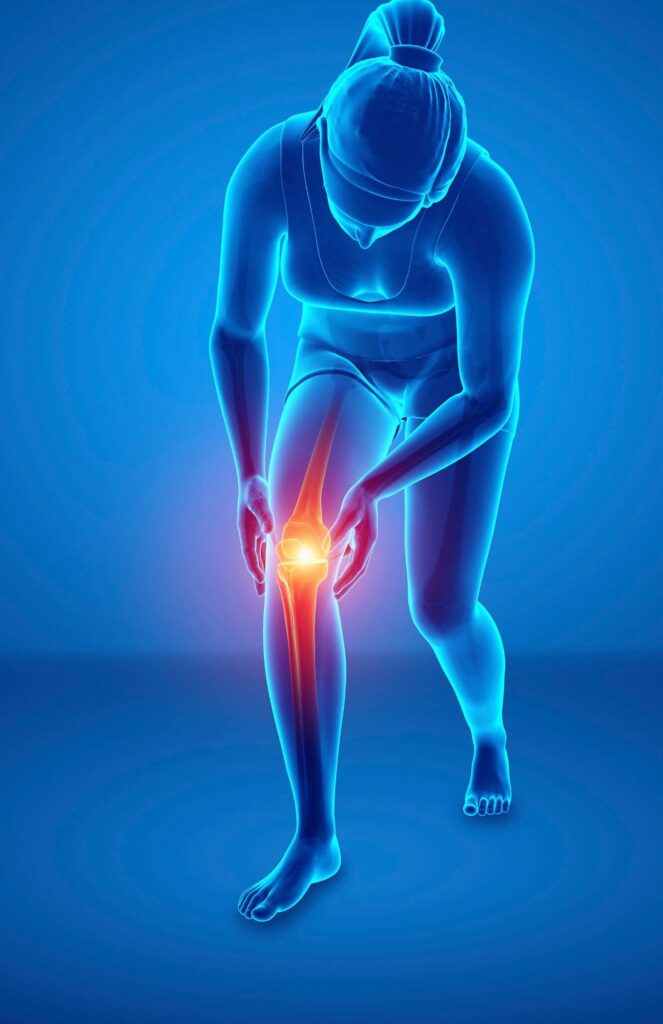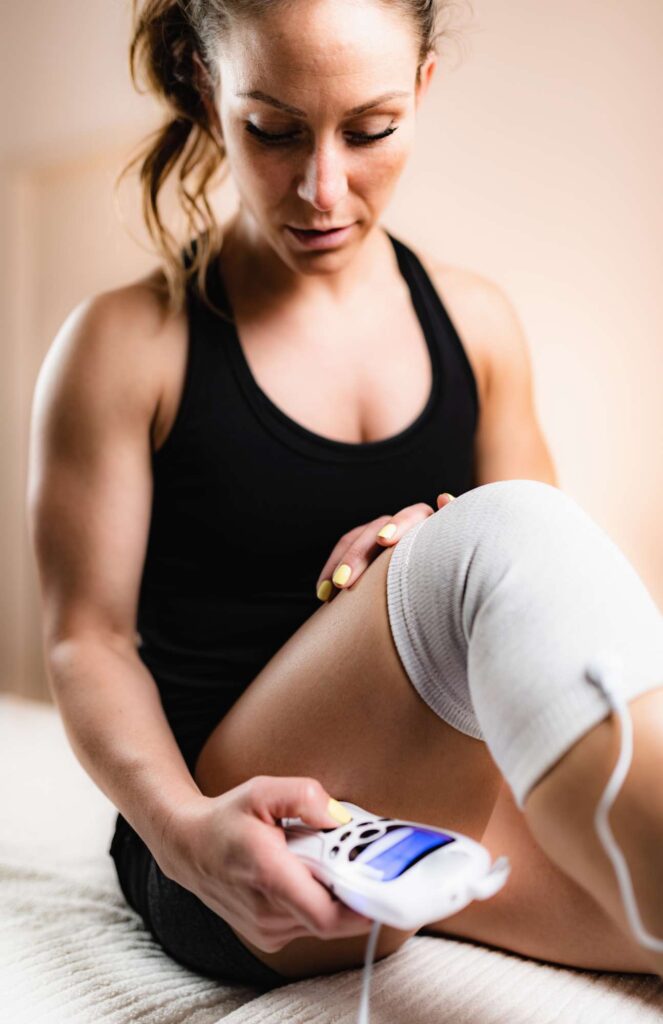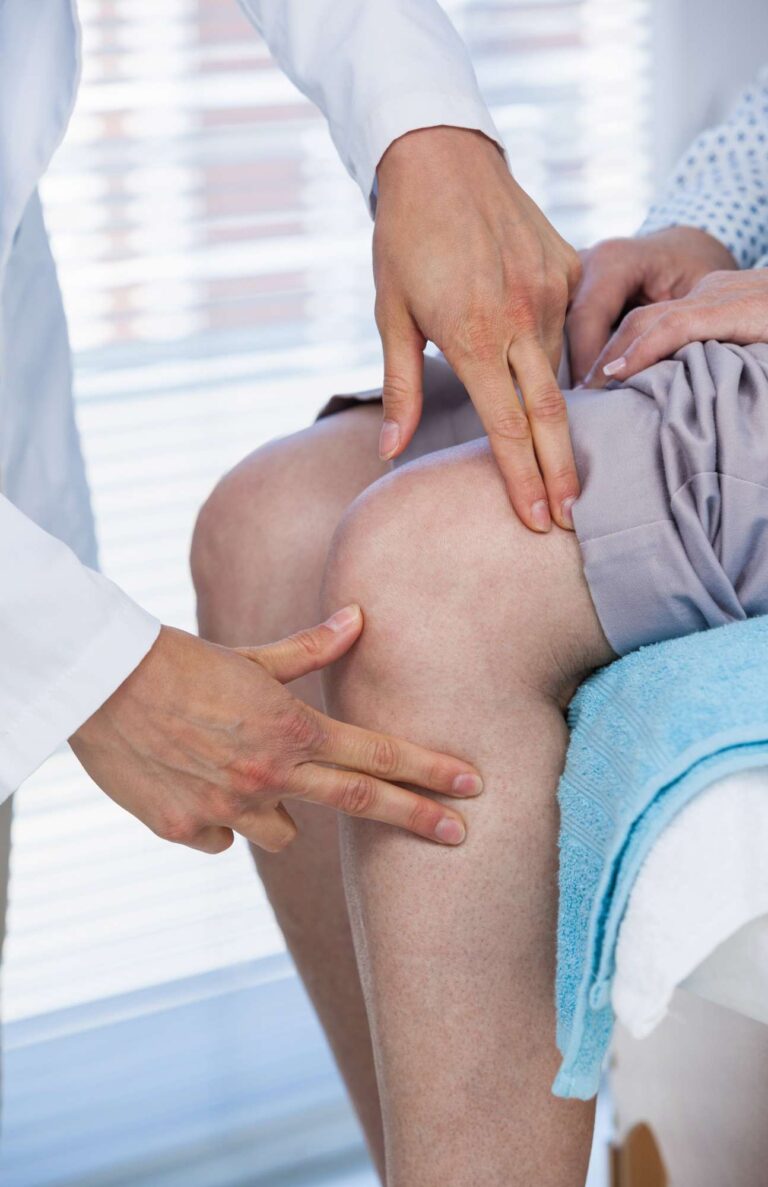Why Is My Knee Clicking? Stop the Painful Noise Now!
As a chiropractor, I frequently get asked, “why is my knee clicking?” from my patients. And, as a former gymnast and competitive cheerleader, I experienced a knee injury many years ago which resulted in knee clicking and pain.
In this article, I will share my findings with you, shedding light on the common causes of knee clicking, medical conditions associated with it, when to see a doctor, how it is diagnosed, treatment options, exercises and stretches to alleviate the clicking, and preventive measures to ensure the long-term health of your knees.
Table of Contents
Why is my Knee Clicking? Common Causes
If you’ve ever wondered “why is my knee clicking?”, you’re not alone. It is a common issue that affects many individuals, regardless of age or activity level. The sound can vary from a soft click to a loud popping noise, and it may be accompanied by knee pain or discomfort.
It’s important not to get the knee clicks or knee popping sensation mixed up with the sound of tiny air bubbles or gas bubbles that naturally occur in the knee joint. These tiny bubbles popping sound the same as when you crack your knuckles.
One of the most common causes of knee clicking is meniscus tears. The meniscus is a rubbery, c-shaped piece of cartilage that acts as a shock absorber between the shin bone and thighbone. A torn meniscus can cause the knee to click or pop.
Another common culprit of clicking knees is loose cartilage. This can occur when a piece of cartilage breaks off and floats around in the knee joint, causing a clicking sound.
Other causes of knee clicking include ligament injuries (ACL- anterior cruciate ligament, MCL- medial collateral ligament, PCL- posterior cruciate ligament), tendinitis, and arthritis. In some cases, the clicking may be due to a misalignment of the knee cap, a condition known as patellar tracking disorder. Patellofemoral pain syndrome (aka runner’s knee) is another condition commonly associated with painful clicking.

Medical Conditions Associated with Knee Clicking
While “noisy knees” can often be attributed to minor issues such as wear and tear or overuse, it can also be a symptom of underlying medical conditions.
One such condition is osteoarthritis, a degenerative joint disease that causes the cartilage in the knee to wear down over time. As the cartilage deteriorates, the bones in the knee may rub together, resulting in clicking or popping sounds.
Another condition commonly associated with the question,”why is my knee clicking?” is rheumatoid arthritis, an autoimmune disease that causes inflammation and damage to the joints.
Additionally, bursitis and synovitis, which are conditions characterized by inflammation of the bursae and synovial fluid respectively, can also lead to knee clicking.
The most common knee injuries include ligament sprains, meniscus tears, and patellofemoral pain syndrome. These injuries can cause misalignment in the knee joint, leading to clicking or popping sounds when moving the knee.
In some cases, a traumatic injury such as a bone fracture or dislocation can also result in knee clicking. This is often accompanied by other symptoms such as swelling, bruising, and severe pain.
It is important to note that if you are asking yourself, “why is my knee clicking?” along with experiencing other symptoms such as swelling, redness, or severe pain, I highly recommend you consult a healthcare professional for an accurate diagnosis.
When to See a Doctor for Knee Clicking
It’s important to know when to see an orthopedic doctor for knee pain!
While occasional knee clicking is usually harmless, there are instances where seeking medical attention is warranted. If your knee clicking is accompanied by severe pain, swelling, or instability, it is crucial to consult a doctor. These symptoms could indicate a more serious underlying issue that requires prompt medical intervention. But, try not to worry, you probably don’t need a knee replacement.
If you find yourself asking, “why is my knee clicking?” more frequently, it’s interfering with your daily activities or causing significant discomfort, it’s recommended to seek professional guidance. A healthcare professional will be able to perform a thorough examination, order any necessary diagnostic tests, and provide you with an accurate diagnosis and appropriate treatment plan.
Diagnosing Knee Clicking
To determine the cause of your question, “why is my knee clicking?”, a healthcare professional will typically begin with a comprehensive evaluation of your medical history and a physical examination. During the physical examination, they may manipulate your knee joint, assess your range of motion, and listen for any clicking or popping sounds.
In some cases, imaging tests such as X-rays, MRIs, or CT scans may be ordered to get a clearer picture of the knee joint and identify any structural abnormalities. These tests can help rule out or confirm conditions such as meniscus tears, loose cartilage, or arthritis.
Once a diagnosis is made, the healthcare professional will discuss the appropriate treatment options based on the underlying cause of your knee clicking.

Treatment Options for Knee Clicking
The treatment for knee clicking depends on the underlying cause and severity of the condition.
In cases where the clicking is caused by minor issues such as overuse or muscle imbalances, conservative treatments such as rest, ice, compression, and elevation (RICE), along with physical therapy, may be recommended.
Physical therapy can help strengthen the muscles around the knee, improve joint stability, and correct any alignment or biomechanical issues that may be contributing to the clicking.
If the knee clicking is due to a more serious condition such as a meniscus tear or ligament injury, surgical intervention may be necessary. In such cases, arthroscopic knee surgery may be performed to repair or remove the damaged tissue.
It is important to follow the treatment plan prescribed by your healthcare professional and listen to any post-operative rehabilitation protocols to ensure optimal recovery.
Exercises and Stretches to Alleviate Knee Clicking
In addition to the prescribed treatment options, certain exercises and stretches can help alleviate knee clicking and improve overall knee health.
Strengthening exercises for the quadriceps, hamstrings, and calf muscles can provide stability to the knee joint and reduce the risk of clicking. Examples of such exercises include squats, lunges, leg presses, and calf raises.
Stretching exercises that target the muscles surrounding the knee, such as the quadriceps and hamstrings, can also be beneficial in relieving tension and reducing clicking. Some effective stretches include hip flexor stretches, standing quadriceps stretches, hamstring stretches, and IT band stretches.
Foam rolling after stretching and exercising is an essential part of any fitness routine. Not only does it help to release tension and tightness in the muscles, but it also improves circulation and range of motion. Plus, it feels great! Learn how to foam roll for knee pain.
Remember, it’s essential to perform these exercises and stretches under the guidance of a qualified healthcare professional or a certified physical therapist to ensure proper form and prevent any further injury.

Preventing Knee Clicking in the Future
Prevention is always better than cure, and when it comes to knee clicking, there are steps you can take to protect your knees and minimize the risk of developing this bothersome condition.
First and foremost, maintaining a healthy weight is crucial as excess weight puts additional stress on the knee joints.
Engaging in regular exercise that focuses on strengthening the muscles around the knee can also help protect the joint and reduce the risk of clicking.
Proper warm-up and cool-down routines before and after physical activity can prepare your body for exercise and prevent unnecessary strain on the knee.
It is also important to wear appropriate footwear that provides adequate support and cushioning for your feet and knees.
For added stability, you can check out a knee brace to help prevent further damage.
Finally, listen to your body and avoid activities or movements that cause pain or discomfort in your knees. If you experience any new or persistent symptoms, consult a healthcare professional for guidance.
Alternative Therapies for Knee Clicking
In addition to conventional treatment options, there are alternative therapies that may provide relief if you are asking yourself, “why is my knee clicking?”
These therapies focus on holistic approaches to wellness and may include techniques such as acupuncture, massage therapy, and chiropractic adjustments.
Acupuncture involves the insertion of thin needles into specific points on the body to alleviate pain and promote healing. Scientific studies have shown evidence that acupuncture is an effective treatment for pain associated with osteoarthritis of the knee.
Massage therapy can help reduce muscle tension, improve circulation, and enhance overall joint mobility.
Chiropractic adjustments aim to restore proper alignment of the spine and joints, which can alleviate pressure on the knee joint.
While these alternative therapies may not be suitable for everyone, they can be worth exploring as complementary options to conventional treatment. It is important to consult with a qualified practitioner before undergoing any alternative therapy to ensure its safety and efficacy for your specific condition.
Conclusion: Taking Care of Your Knees
In conclusion, knee clicking is a common issue that can be caused by a variety of factors, ranging from minor muscle imbalances to more serious medical conditions. While occasional clicking is usually harmless, persistent or accompanied by pain warrants medical attention.
By understanding the causes, seeking timely diagnosis and appropriate treatment, engaging in targeted exercises and stretches, and adopting preventive measures, you can take proactive steps to care for your knees and maintain their health and functionality.
Remember, your knees are essential for your mobility and overall well-being, so it’s important to prioritize their care and listen to any signals they may be sending. If you’re asking yourself, “why is my knee clicking?”, don’t ignore it – take action to uncover the cause and find the solution that’s right for you. Your knees will thank you!
Take charge of your knee health today and consult a healthcare professional if you’re experiencing persistent knee clicking or any other concerning symptoms. Remember, early intervention can make a significant difference in your recovery and long-term knee health. Don’t wait – prioritize your knees and take the first step towards a pain-free life!






